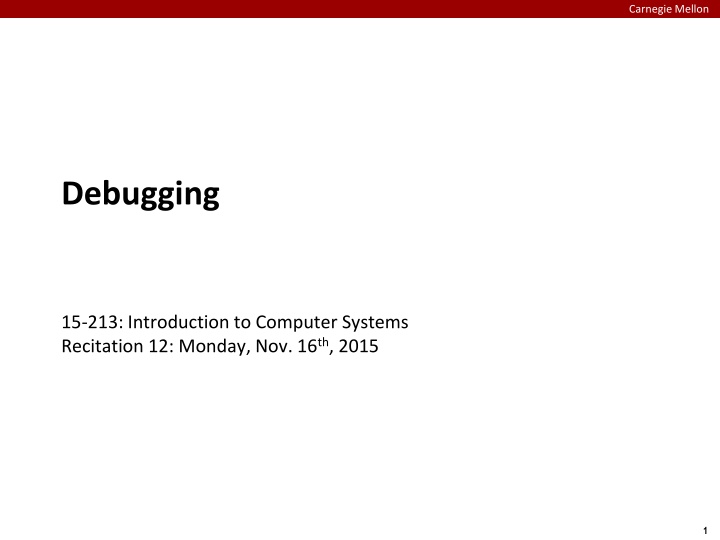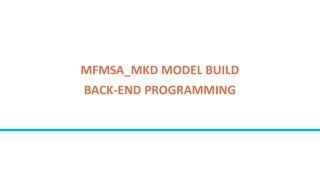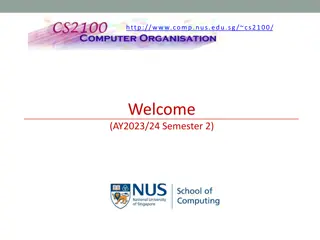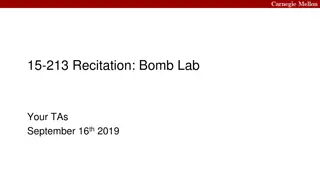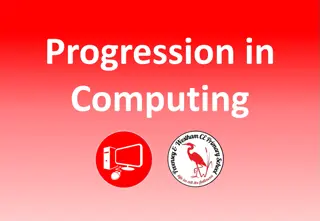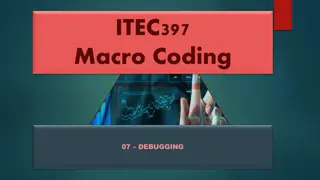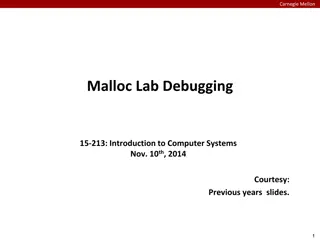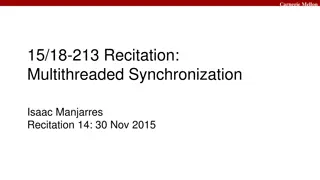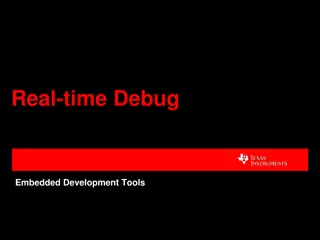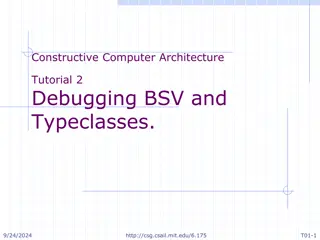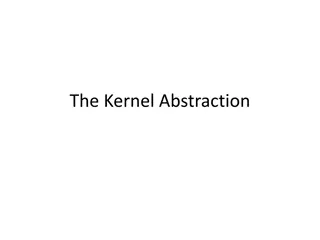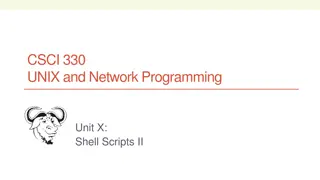Debugging
Carnegie Mellon University's course material on debugging memory errors covers topics such as identifying errors, resolving segfaults, using gdb for troubleshooting, and maintaining heap integrity through heap checking. The content provides insights into common errors, techniques for effective debugging, and best practices for ensuring memory management accuracy in computer systems.
Download Presentation

Please find below an Image/Link to download the presentation.
The content on the website is provided AS IS for your information and personal use only. It may not be sold, licensed, or shared on other websites without obtaining consent from the author.If you encounter any issues during the download, it is possible that the publisher has removed the file from their server.
You are allowed to download the files provided on this website for personal or commercial use, subject to the condition that they are used lawfully. All files are the property of their respective owners.
The content on the website is provided AS IS for your information and personal use only. It may not be sold, licensed, or shared on other websites without obtaining consent from the author.
E N D
Presentation Transcript
Carnegie Mellon Debugging 15-213: Introduction to Computer Systems Recitation 12: Monday, Nov. 16th, 2015 1
Carnegie Mellon News Malloc Lab due Thursday Nov 19th 2
Carnegie Mellon Errors Some errors are identified by the driver The error message is straightforward in most cases garbled byte means part of the payload returned to the user has been overwritten by your allocator out of memory occurs when the memory is used very inefficiently, or there are lost blocks 3
Carnegie Mellon Errors But most of the times Do gdb mdriver and run to find out which line segfaults Note that a segfault occurring at line 200 could actually be caused by a bug on line 70 4
Carnegie Mellon Segfault To resolve a segfault, it is necessary to find the earliest time things went wrong. One way to do this is to print the whole heap before/after relevant functions Scroll up from the point of segfault and find the earliest operation that makes the heap look wrong Sometimes this gives too much information, not all of which are useful The heap checker can make this easier Checks violation of invariants (corruption of the heap) 5
Carnegie Mellon Heap Checker Once you ve settled on a design, write the heap checker that checks all the invariants of the particular design The checking should be detailed enough that the heap check passes if and only if the heap is truly well-formed Call the heap checker before/after the major operations whenever the heap should be well-formed Define macros to enable/disable it conveniently e.g. 6
Carnegie Mellon Invariants (non-exhaustive) Block level: Header and footer match Payload area is aligned List level: Next/prev pointers in consecutive free blocks are consistent Free list contains no allocated blocks All free blocks are in the free list No contiguous free blocks in memory (unless you defer coalescing) No cycles in the list (unless you use circular lists) Segregated list contains only blocks that belong to the size class Heap level: Prologue/Epilogue blocks are at specific locations (e.g. heap boundaries) and have special size/alloc fields All blocks stay in between the heap boundaries And your own invariants (e.g. address order) 7
Carnegie Mellon Hare and Tortoise Algorithm Detects cycles in linked lists Set two pointers hare and tortoise to the beginning of the list During each iteration, move the hare pointer forward two nodes and move the tortoise forward one node. If they are pointing to the same node after this, the list has a cycle. If the hare reaches the end of the list, there are no cycles. 8
Carnegie Mellon Other things to watch for Uninitialized pointers and/or memory Make sure mm_init() initializes everything It is called by the driver between each iteration of every trace If something is overlooked, you might be able to pass every single trace file, but the complete driver test will fail 9
Carnegie Mellon Valgrind To check for Illegal accesses, uninitialized values 10
Carnegie Mellon Asking for help It can be hard for the TAs to debug your allocator, because this is a more open-ended lab Before asking for help, ask yourself some questions: What part of which trace file triggers the error? Around the point of the error, what sequence of events do you expect? What part of the sequence already happened? If you can t answer, it s a good idea to gather more information How can you measure which step worked OK? printf, breakpoints, heap checker 11
Carnegie Mellon Asking for help Bring to us a detailed story, not just a plot summary Allocations of size blah corrupt my heap after coalescing the previous block at this line number... is detailed It segfaults is not Most importantly: don t hesitate to come to office hours if you really need help 12
Carnegie Mellon Beyond Debugging: Error prevention It is hard to write code that is completely correct the first time, but certain practices can make your code less error-prone Plan what each function does before writing code Draw pictures when linked list is involved Consider edge cases when the block is at start/end of list Write pseudocode first Document your code as you write it 13
Carnegie Mellon Beyond Debugging: Version control I had 60 util points just 5 minutes ago! Save the allocator after each major progress Most basic: copy files around using the cp command Alternatively: keep different versions in separate c files, and use ln s mm-version-x.c mm.c to start using a particular version Or use git/svn/cvs Make sure your repository is private if you use remote repos 14
Carnegie Mellon Optimization To achieve better performance, sometimes you would want to tweak certain parameters. Number of size classes, the separation of size classes, the amount by which the heap is extended (CHUNKSIZE) It is better to write modular and encapsulated code so that changing the parameters only requires changing a few lines of code Use macros wisely 15
Carnegie Mellon Optimization When you hit a bottleneck, find which part is limiting your performance A profiler is good for this kind of job To use gprof: Change the Makefile to add -pg to the compilation flag Run the driver. This will generate a file called gmon.out Run gprof ./mdriver to see the result Don t forget to change the Makefile back 16
Carnegie Mellon Final Words Start now, if not already Come to office hours early Write the heap checker well Be prepared to start over several times Before handing in, check: Does the header comment contain a detailed description of your approach? Is the indentation correct? Any line over 80 chars? (go to autolab to verify these) 17
Carnegie Mellon Questions? Good luck! 18
